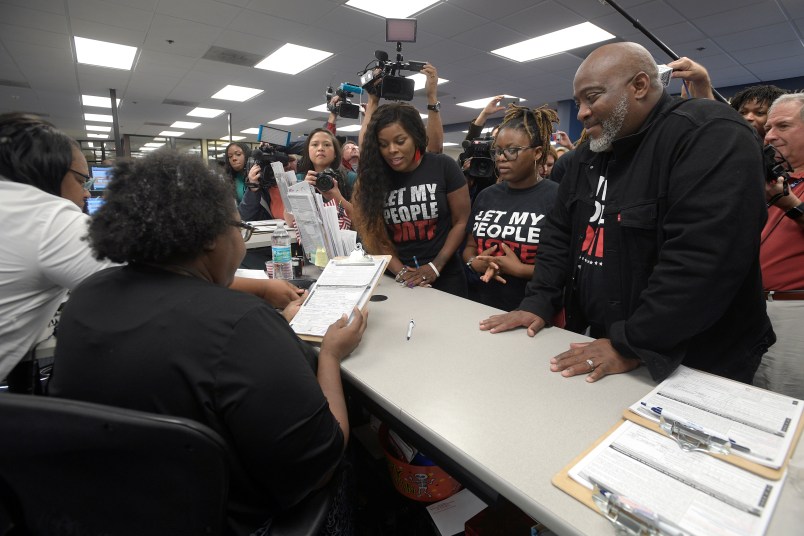A federal judge ruled Sunday that a Florida law requiring people with felony convictions to pay off all their court fines and fees before being able to register to vote is unconstitutional.
Calling the fee requirements “taxes in substance though not in name,” Judge Robert Hinkle of the Northern District of Florida decried the “pay-to-vote system” as failing to stand up to constitutional scrutiny. He said that the law cannot discriminate against people who, after serving out their sentences, are only barred from the franchise of voting by their inability to afford the various fees.
Florida Governor Ron DeSantis’ (R) office did not respond to inquiries about an appeal. However, if the state does appeal the decision, it would go to the Eleventh Circuit Court of Appeals — the very court whose previous order much of Hinkle’s decision is built on top of.
“The United States Court of Appeals for the Eleventh Circuit affirmed, squarely holding that Florida cannot prevent an otherwise-eligible felon from voting just because the felon has failed to pay LFOs the felon is genuinely unable to pay,” he wrote. Saying that the court is following the Eleventh Circuit’s decision, though it would come to the same conclusion anyway, Hinkle added that “on the inability-to-pay claim, the Eleventh Circuit’s analysis is more important than anything included in this order.”
The state has found itself in this position after Republican lawmakers fought tooth and nail to have the fines and fees restriction added to a sweeping voting rights amendment Florida voters approved in 2018.
That amendment, known as Amendment 4, automatically restored voting rights to all felons — except those sentenced for felony murder or sex crimes — when they finished serving out their sentences. Some 1.4 residents with felony convictions could register to vote, under the amendment.
But the Republican-majority legislature wasted no time in its attempt to narrow the scope of the re-enfranchisement, passing a law later signed by DeSantis that forced those who completed their sentences to pay off a slew of fees before they could register. The Republican lawmakers argued that Florida voters understood that the payments would be part of the deal when they voted for the amendment.
Judge Hinkle took the knees out from that argument, taking an almost derisive tone in his response to the lawmakers’ argument.
“Surely very few Florida voters knew that fees and costs were imposed regardless of ability to pay, that the overwhelming majority of felons who would otherwise be eligible to vote under Amendment 4 owed amounts they were unable to pay, and that the State had no ability to determine who owed how much,” he wrote. He also laid out the state’s “byzantine” procedure of charging fees and fines.
Voting rights advocates are trumpeting the decision as a huge win.
“The court recognized that conditioning a person’s right to vote on their ability to pay is unconstitutional,” Julie Ebenstein, senior staff attorney with ACLU’s Voting Rights Project, said in a statement. “This ruling means hundreds of thousands of Floridians will be able to rejoin the electorate and participate in upcoming elections. This is a tremendous victory for voting rights.”
Daniel Tilley, the ACLU of Florida legal director, added that while the state is “likely” to appeal the decision, “we’re ready to take this fight all the way to the U.S. Supreme Court.”
Read Judge Hinkle’s decision here:



